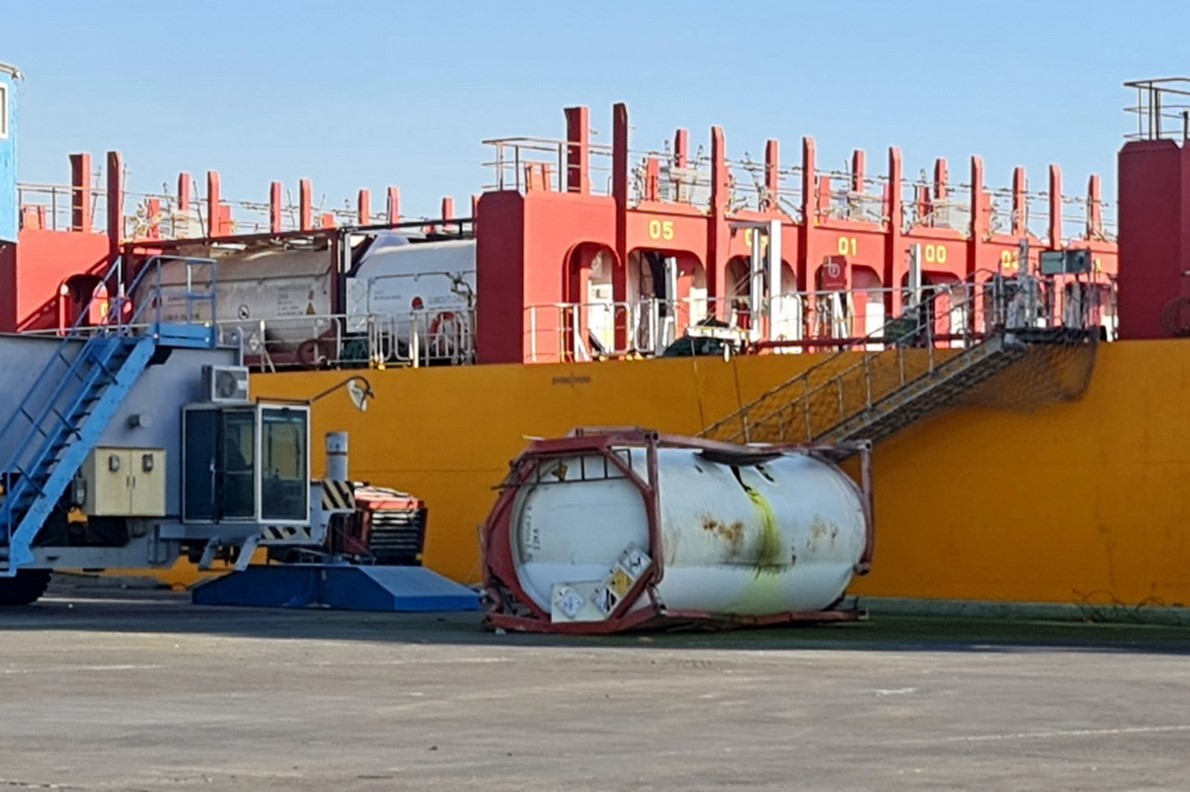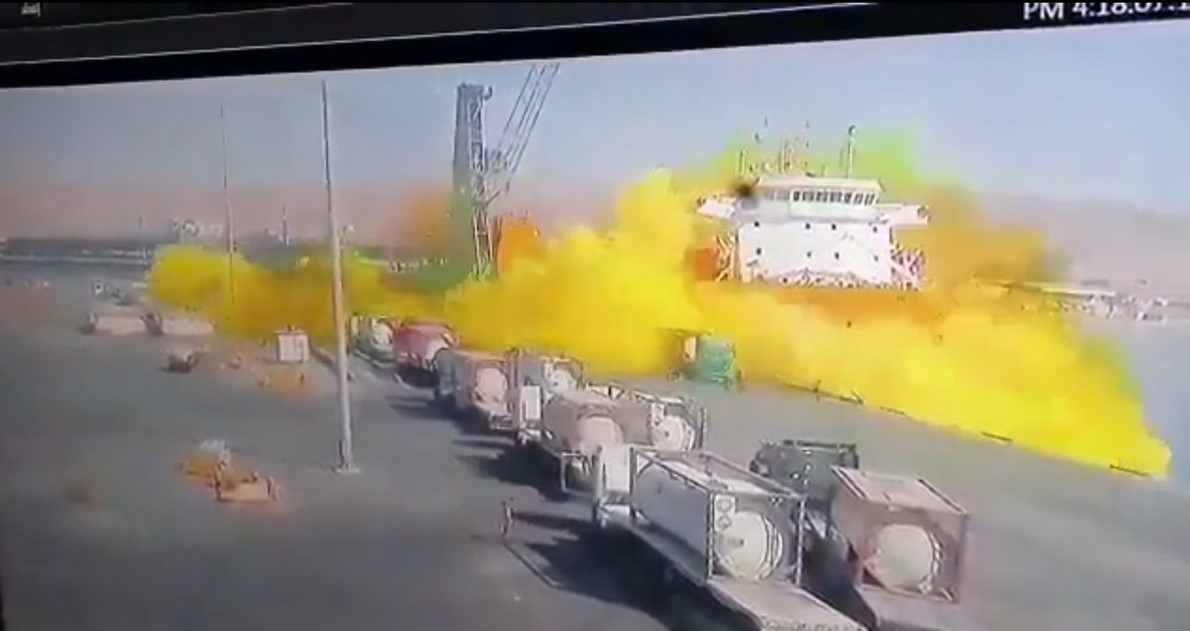AMMAN — A gas leak from a ruptured chlorine tank at the Aqaba Port killed 13 and
injured some 260 others on Monday.
Eight Jordanians and four foreigners have died. Some
45 emergency responders were injured.
اضافة اعلان
At 5:15pm, the tank containing liquefied chlorine
gas ruptured when the steel cable carrying it onto a ship broke, dropping the
tank, according to Hamzeh Al-Hajj Hassan, the deputy chief commissioner of the
Aqaba Special Economic Zone Authority.
At a press conference held late on Monday, Minister
of State for Media Affairs Faisal Shboul said that the site was being
sterilized and underlined that the situation in Aqaba is “under control, and
there is no risk to the city, its people and its visitors any more”.
 A partial view shows the tank that fell while being transported, causing a toxic gas leak in Jordan’s Aqaba New Port on June 27, 2022. Footage on Al-Mamlaka TV showed a large cylinder plunging from a crane on a moored vessel, causing a violent explosion of yellow gas.
A partial view shows the tank that fell while being transported, causing a toxic gas leak in Jordan’s Aqaba New Port on June 27, 2022. Footage on Al-Mamlaka TV showed a large cylinder plunging from a crane on a moored vessel, causing a violent explosion of yellow gas.
He added that a security perimeter of 5km around the
port had been established and that Aqaba’s southern beach was evacuated
following the incident.
Public Security Directorate (PSD) spokesperson Amer
Al-Sartawi said that specialized teams from the Civil Defense Department
responded to the incident at the Aqaba New Port, roughly 26km from the city of
Aqaba. PSD had earlier set up a 500m cordon around the area.
In a telephone interview, Shboul, who is also the
government spokesperson, told
Jordan News there was no danger to
residential areas as they are “far enough away”. He added that a southerly wind
would not carry the gas closer to the city’s residential areas.
Prime Minister Bisher Al-Khasawneh announced an
investigation into the incident headed by Interior Minister Mazen Al-Faraya,
according to Shboul.
HRH Crown Prince Hussein, at the National Center for
Security and Crisis Management (NCSCM), was following up on the evacuation and
rescue operations.
The Crown Prince offered his condolences to the
families of the victims who died in the accident, and wished a speedy recovery
for the injured.
Those injured were evacuated to several nearby
hospitals, according to PSD. They were reported as being in bad to critical
condition, according to Aqaba Health Director Jamal Obeidat, who added that
“the number of deaths increases by the minute.”
He said that the field hospital in Aqaba can receive
new patients, but that the city’s hospitals are at capacity.
 A screengrab from a video showing toxic gas expanding from a ruptured tank at Aqaba New Port on June 27, 2022. (Photo: Twitter)
A screengrab from a video showing toxic gas expanding from a ruptured tank at Aqaba New Port on June 27, 2022. (Photo: Twitter)
More health centers will be made available as
required, the director said.
A total of 123 people were hospitalized, including
five emergency responders.
The NCSCM, in
coordination with the Jordan Armed Forces-Arab Army, deployed four air
evacuation planes to support, according to the
Jordan News Agency, Petra.
The NCSCM urged residents in Aqaba not to gather in
front of hospitals to allow ambulance and rescue teams to move freely.
Aqaba Governor Mohammad Rafaiah said the situation
was “under control”.
The former director-general of the Aqaba Company for
Ports Operation and Management, Muhammad Al-Mubaidin, was quoted by Al-Mamlaka that
based on the information available to him, a ship in berth no. 2 in the Aqaba
New Port was loading approximately 20 tanks of liquefied chlorine gas.
Chlorine gas, which expands about 457 times from
liquid to gas, can be recognized by its pungent, irritating odor, similar to
that of bleach, according to the US Centers for Disease Control and Prevention.
If exposed to dangerous concentrations of chlorine
gas, symptoms may include blurred vision, burning pain, redness, and blisters
on the skin.
If high concentrations of chlorine gas are inhaled,
one may feel a burning sensation in the nose, throat, and eyes, alongside
coughing, chest tightness, and difficulty breathing. The effects may be delayed
if the gas is inhaled in low concentrations.
A port worker, on condition of anonymity due to his
role, told
Jordan News that equipment at the Aqaba Company for Ports Operation
and Management is allegedly poorly maintained and is used past its “operational
life”, including crane cables.
“We are required to load five to 10 tonnes in a shift,” the
port worker alleged, claiming that “workplace safety is ineffective at the company”,
and that not all the workers are qualified.
Read more Features
Jordan News



